
Tomorrow, May 6, the Supreme Court will hear arguments in Trump v. Pennsylvania/Little Sisters of the Poor Saints Peter and Paul Home v. Pennsylvania, two consolidated cases challenging the Department of Health and Human Services October 2017 rules that drastically expanded employers and universities’ ability to claim a religious or moral exemption from the contraceptive coverage requirements of the Affordable Care Act. This is the third time that challenges to the birth control benefit have reached the Supreme Court.
The ACA requires insurance plans to cover all FDA-approved forms contraception as part of basic preventive coverage. Thanks to this provision, an estimated 62 million Americans have been able to access birth control with no additional cost. Houses of worship are exempt from this requirement. And, though not exempt, religious non-profit organizations and closely held corporations whose owners have religious objections are eligible for an accommodation that allows them to opt out of directly paying for contraceptive coverage. Under the Religious Freedom Restoration Act (RFRA), such organizations can fill out a form requesting an accommodation, and the government will make a separate arrangement with a third-party insurance provider to ensure the employer’s workers still receive contraceptive coverage.
In 2016, several religious non-profits argued that this accommodation violated their rights under RFRA. Yet, when the case reached the Supreme Court, the 8-justice Court was deadlocked and kicked the case back to the lower courts. (See RAC blogs on Zubik v. Burwell for more coverage of this case)
That brings us to tomorrow’s case. In October 2017, the Trump administration issued a sweeping expansion of the exemptions. Instead of filling out an accommodation form, universities and employers, including publicly-traded companies, can simply opt-out of the birth control benefit based on religion belief or due to a “sincerely held moral” conviction. Such exemptions would leave students and employees with the burden of finding the means to cover their contraceptives themselves.
While the lower courts temporarily blocked these rules from taking effect, the constitutionality of these regulations, including the way that the administration circumvented standard protocol by bypassing the “notice and comment” period necessary to release the rules, will take center stage during oral arguments – held by teleconference due to COVID-19.
If the Supreme Court allows the rules to stand, millions of Americans are at risk of losing their birth control benefits. The Reform Movement has a strong and long-standing history of supporting both religious freedom and reproductive rights. As members of a religious minority, we believe that all people deserve to freely practice their faith. At the same time, we believe characterizing these rules as a “win” for religious liberty is a false characterization of free practice of faith. Jewish tradition emphasizes values like human dignity and moral agency — and we also know that for some, access to birth control is an extension of their own religious freedom.
As we’ve watched the COVID-19 pandemic unfold in recent weeks, we are reminded how imperative it is that all individuals are able access quality health care for themselves and their families. We affirm our support for reproductive rights and contraception not despite our Judaism—but because of it, and we remain committed to working towards a world where every individual gets to shape their reproductive and family lives with dignity.
Related Posts

Continuing to Educate and Empower People Together

My Challah-Making Experience


